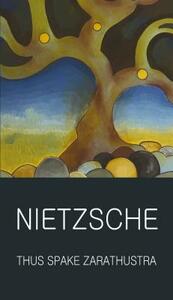Take a photo of a barcode or cover
I read this book much as it was written - in parts, over the course of 2 years. It was not always an easy journey but a worthwhile one. For all his eccentricities, Nietzsche's philosophy remains immensely relevant to our modern world.
PS: If you speak German, read the original text. I believe some of the ways he plays with language to convey a multi-layered message does not fully translate.
PS: If you speak German, read the original text. I believe some of the ways he plays with language to convey a multi-layered message does not fully translate.
adventurous
challenging
inspiring
reflective
slow-paced
Nietzsche wasnt a heretic or a maniac. He disassembled what he thought was redundant and useless. He liberated himself and then laid down the path to greatness. Amor Fati. Eternal Recurrence. The Ubermensch. The Will to Power.
inspiring
reflective
He "Zarathustra" is sensible, friendly, playful, serious, ancient, modern and lyrical. He speaks of a deep loneliness and at the same time a great desire for care.
Zarathustra's teached is mainly about man who developed his own will, elevate himself above his own virtues and not to be "bent hands". Zarathustra is looked for the
"superman" or "higher person" who is able to overcome his own origins, his affection desire.
In places Nietzsche's work is instructive. His criticism of society's peer pressure seems to me to be very visionary for the time it was written.
Zarathustra's encounters in the 1st and 4st parts with the two kings, the magician, the ugliest person, the voluntary beggar and the shadow are particularly thought-provoking and still seem relevant today.
The book can be grabbed, irritated and touched you deeply. And you can got a new point of view.
challenging
informative
reflective
slow-paced
Plot or Character Driven:
Plot
Strong character development:
No
Loveable characters:
No
Diverse cast of characters:
No
Flaws of characters a main focus:
No
challenging
informative
slow-paced
challenging
reflective
relaxing
slow-paced
challenging
mysterious
There's a claim to be made that Nietzsche is the most iconic philosopher in popular culture, which, through the transitive property, would make Thus Spoke Zarathustra the most iconic book of philosophy. Because Thus Spoke Zarathustra is structured like a biblical work or a myth, centering itself around the folkloric hero-figure Zarathustra and his grand philosophical pronouncements, nearly all of which are subjectively interpreted and misinterpreted by every other character, it demands to be understood in a literary sense, and with the qualities of literature comes a potentially broad subjectivity in analytical conclusions reached by the readership. Unlike most of the western philosophical canon, in which analyses of nature or ethics or society (or whatever) are complimented by strong central arguments supported by dozens or hundreds of examples of supporting evidence, every major idea in Thus Spoke Zarathustra happens within the boundless confines of fiction, inviting more freeform interpretations than straightforward refutations.
What this means, in total, is that you get out what you put in to Thus Spoke Zarathustra. This makes Thus Spoke Zarathustra simultaneously massively popular and incredibly easy to misinterpret. Consider Nietzsche's concept of the Will To Power, which could be fairly summarized (I think) as the basic concept of self-actualization as it manifests in the social, except characterized specifically as social influence through power/strength. More obviously, there's the concept of the Ubermensch, a man who becomes ontologically superior to other, lesser men, destined to lead by strength of character. Is it any surprise, given the elastic nature of Nietzsche's writing, that this philosophy, which manifests itself through strength, power and superiority, creating an aspirational figure of worship after the death of God, would become co-opted by some of the worst people in human history?
Of course, the nature of this misinterpretation is also a major themstic pillar upholding Thus Spoke Zarathustra as a text. As Zarathustra proselytizes, his followers inevitably fail to understand him, forcing him back into his cave to ponder his own philosophy. Even as Zarathustra evolves his philosophy and demonstrates it to the un-evolved general public - as is the prerogative of the Ubermensch, I suppose - social progress is still messy, and fraught with errors.
A sympathetic reader might interpret this maneuver as a future-proofing of the claims made by the book; that while Zarathustra's popularity and influence exhibit the Ubermensch's capability to push the world forward, it also depicts how that figure destabilizes the normative boundaries of philosophy and discourse, and how it could, in fact, lead the non-Ubermensches among us to ruin, especially those who possess a destructive rather than constructive outlook. If anyone were to read Thus Spoke Zarathustra anti-productively, well, that's simply part of the process of Zarathustra's philosophy, each radical Ubermensch Fellowship a historical footnote on the path to am enlightened, Ubermensch-led future.
However, I am not a sympathetic reader. It's difficult, but not impossible, to develop a fully-fledged analytical method through the use of fables or semi-fictional narratives. Fictionalized narratives form the basis of Plato's work, as he outlined his analytical method through fictionalized accounts of Socratic Dialogues.
But herin lies the problem of Nietzsche's fiction. In his method of developing a system of ethics and a more equitable society, Plato demonstrates the necessity of debate between conflicting points of view. Socrates' big ideas are always met with interrogation. Socrates' perspective does not triumph over his detractors because he is somehow ontologically superior as a man, but because he deeply considers the method of analysis of his opponents and either absorbs or discards it depending on its utility. Although one perspective is ultimately found to be 'superior,' it is superior because it can demonstrate its superiority through a presentation of its mechanical logic - furthermore, the perspective is only demonstrated as superior because it is collaborative, because other people interface with it, test it, and acknowledge its strengths or weaknesses.
Zarathustra, in contrast with Socrates, does not produce his philosophical truth through rigorous testing in the wild and wacky field of the social - he dominates the social with his pronouncements, establishing a kind of master/servant dichotomy, an intellectual class system, between himself and his hapless followers. Truth, to Nietzsche, is ascertained via the alienation from outside influence, not via active engagement with the ideologies which negate him, but privately, away from opposition. In the tradition of the Stoics, truth is something Zarathustra invents for himself, something that exists in his head, and which must be spread from the top-down, from superiors to inferiors; it's shot through with raw egotism, and regularly collapses upon collision with the social. Like the Stoics, Zarathustra's - and, by extension, Nietzsche's - philosophy is more easily accepted as a kind of aesthetic of philosophy than as a productive method of thought, analysis or critical interrogation.
What this means, in total, is that you get out what you put in to Thus Spoke Zarathustra. This makes Thus Spoke Zarathustra simultaneously massively popular and incredibly easy to misinterpret. Consider Nietzsche's concept of the Will To Power, which could be fairly summarized (I think) as the basic concept of self-actualization as it manifests in the social, except characterized specifically as social influence through power/strength. More obviously, there's the concept of the Ubermensch, a man who becomes ontologically superior to other, lesser men, destined to lead by strength of character. Is it any surprise, given the elastic nature of Nietzsche's writing, that this philosophy, which manifests itself through strength, power and superiority, creating an aspirational figure of worship after the death of God, would become co-opted by some of the worst people in human history?
Of course, the nature of this misinterpretation is also a major themstic pillar upholding Thus Spoke Zarathustra as a text. As Zarathustra proselytizes, his followers inevitably fail to understand him, forcing him back into his cave to ponder his own philosophy. Even as Zarathustra evolves his philosophy and demonstrates it to the un-evolved general public - as is the prerogative of the Ubermensch, I suppose - social progress is still messy, and fraught with errors.
A sympathetic reader might interpret this maneuver as a future-proofing of the claims made by the book; that while Zarathustra's popularity and influence exhibit the Ubermensch's capability to push the world forward, it also depicts how that figure destabilizes the normative boundaries of philosophy and discourse, and how it could, in fact, lead the non-Ubermensches among us to ruin, especially those who possess a destructive rather than constructive outlook. If anyone were to read Thus Spoke Zarathustra anti-productively, well, that's simply part of the process of Zarathustra's philosophy, each radical Ubermensch Fellowship a historical footnote on the path to am enlightened, Ubermensch-led future.
However, I am not a sympathetic reader. It's difficult, but not impossible, to develop a fully-fledged analytical method through the use of fables or semi-fictional narratives. Fictionalized narratives form the basis of Plato's work, as he outlined his analytical method through fictionalized accounts of Socratic Dialogues.
But herin lies the problem of Nietzsche's fiction. In his method of developing a system of ethics and a more equitable society, Plato demonstrates the necessity of debate between conflicting points of view. Socrates' big ideas are always met with interrogation. Socrates' perspective does not triumph over his detractors because he is somehow ontologically superior as a man, but because he deeply considers the method of analysis of his opponents and either absorbs or discards it depending on its utility. Although one perspective is ultimately found to be 'superior,' it is superior because it can demonstrate its superiority through a presentation of its mechanical logic - furthermore, the perspective is only demonstrated as superior because it is collaborative, because other people interface with it, test it, and acknowledge its strengths or weaknesses.
Zarathustra, in contrast with Socrates, does not produce his philosophical truth through rigorous testing in the wild and wacky field of the social - he dominates the social with his pronouncements, establishing a kind of master/servant dichotomy, an intellectual class system, between himself and his hapless followers. Truth, to Nietzsche, is ascertained via the alienation from outside influence, not via active engagement with the ideologies which negate him, but privately, away from opposition. In the tradition of the Stoics, truth is something Zarathustra invents for himself, something that exists in his head, and which must be spread from the top-down, from superiors to inferiors; it's shot through with raw egotism, and regularly collapses upon collision with the social. Like the Stoics, Zarathustra's - and, by extension, Nietzsche's - philosophy is more easily accepted as a kind of aesthetic of philosophy than as a productive method of thought, analysis or critical interrogation.
challenging
reflective
slow-paced
Obviously, this is the marker of an epoch; however, likely due to the uneducation of my own mind, many of the book’s scenarios felt redundant in how they reiterated ideas with an intent to nuance them. Still, the ending felt very Animal Farm. In a different note, Zarathustra = Uncle Andrew??
Hated it...took me back to philosophy classes at college and while I was able to slog through it the work was simply not one I enjoyed or gained anything from.




